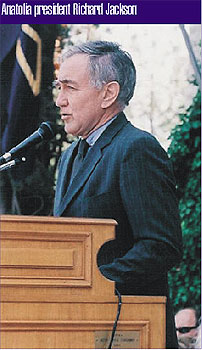Anatolia: A school at the crossroads of history then and now
“It’s not every school whose history spans three centuries, and which continues to thrive while at the crossroads of several cultures and academic traditions.
“We are unique in many ways,” says Anatolia College president Richard Lee Jackson of an institution that made history itself by starting at the dawn of the 19th century in Turkey (with a multi-national faculty), fleeing to Greece with the Greek exodus from Asia Minor, and flourishing today on its 50-acre campus in Thessaloniki, Greece (where it reopened in 1924 after an invitation from Eleftherios Venizelos—“You must come to Thessaloniki. This is our most international city”).

President Jackson himself was a career American foreign service officer before he took the post at the college, which seemed a natural fit.
“Our mission, apart from delivering a first-rate modern education,” he says, “is to be a bridge for mutual understanding between our two countries, Greece and the United States.” (The school was founded by American missionaries and is officially called the American College of Thessaloniki (ACT) and chartered by the state of Massachusetts in America.)
Of the school’s 2500 students (comprising Anatolia Elementary School, Anatolia College and ACT), all are Greek in the primary grades, nearly 96% are Greek at the high school, and 55 % are Greek at the university level, with the remainder coming from neighboring countries and from America.
“With full U.S. accreditation, kids from all over the U.S. can come and do a semester or do a year and then use these credits towards their graduation requirements wherever they’re studying,” says Jackson. “We have two full semester study abroad programs, and then a similar program for maximum two course credit.”
Plus the school is a haven for bright kids from Greece itself and those displaced in recent years from other parts of the Balkans.
“As a refugee school leaving Asia Minor we felt we had a mission first and foremost to offer scholarships to the most deserving kids from the islands and mountain villages,” says Jackson. “Now the needy are in the big cities and usually there are kids from Greek families who have been uprooted from countries of the former Soviet Union, and these kids have a lot of catching up to do. This is the trend of our scholarship students, who make up 11 % percent of our high school.”
But the school is more than just a traditional refuge for refugees: President Jackson calls Anatolia “the best school in northern Greece, if not in the entire country.”
“We have by far the most cutting-edge library and technology center of any private or non-profit in southeastern Europe, courtesy of the Stavros Niarchos Foundation,” he says. “We have the Michael Dukakis chair for public policy and service—the roots of the Dukakis family are in Asia Minor. And we have business programs with American case study business methods adapted to a Greek reality that are unique. We also have a network of 10,000 graduates in all professions.”
An avowed Thessaloniki chauvinist, he concedes Athens has worthy programs, as well, “but Athens is too big for its population. Thessaloniki is on a human scale. And the kids who come here from the States, for example, have the unique experience of looking up from their studies and staring at Mount Olympus, which they might be reading about, or mingling in the cafes with other kids from the States who speak English, but are also Greek. It’s the common sharing of a wonderful culture and it’s a unique learning experience.”
He says the branches of American universities abroad very often are not accredited and Anatolia, anyway, has “a better placement record into the top American universities than any school in the United States, which is an extraordinary claim to make, but has not been contradicted. Only the top students usually apply to our international baccalaureate program. And our counseling is a model for others. In fact, we’ve been asked by the president of Serbia to help train their college advisors.”
The bedrock of the school is the network of alumni (“I say to the students at orientation, I want you to shake hands with the student on your left and right because they’re going to be your friends for life,” says Jackson) and also the voluntary 55-member board of trustees from Greece and the United States.
“Let’s say a Greek American in San Diego would say, we have our own problems here, why should I give to a university in Greece?” says Jackson. “And I would answer by saying that particularly for Americans of Hellenic heritage our school is a very significant educational bridge between these two countries. Graduates create a whole fabric of ties. These kinds of universities, have underpinned the relationship between the U.S. and other countries in a way that presidents, and government administrations, and embassies can’t do. They are our greatest resource.